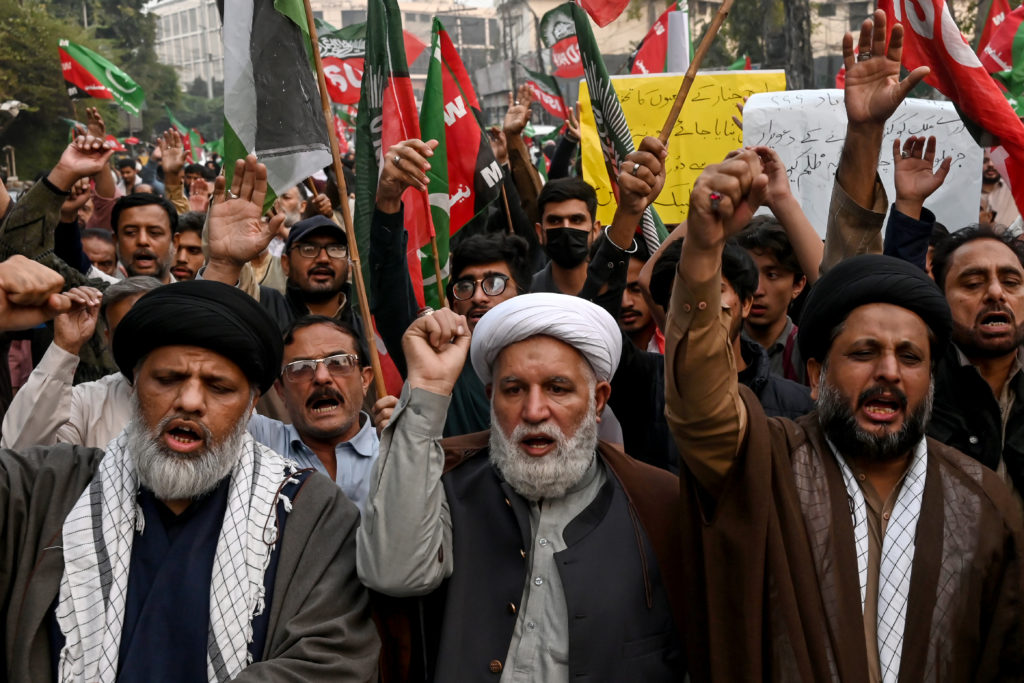Around 300 families fled sectarian violence on Saturday in northwest Pakistan as fresh sectarian clashes killed another 32 people.Sporadic fighting between Sunni and Shiite Muslims in the mountainous Khyber Pakhtunkhwa province bordering Afghanistan has killed around 150 over the past months.”Approximately 300 families have relocated to Hangu and Peshawar since this morning in search of safety,” a senior official told AFP, adding that more families were preparing to leave the province’s Kurram district.Another senior administrative official told AFP on condition of anonymity that “fighting between Shiite and Sunni communities continues at multiple locations”, with 32 people killed in clashes on Saturday, including 14 Sunnis and 18 Shiites.The fresh violence came two days after gunmen opened fire on two separate convoys of Shiite Muslims travelling with police escort in Kurram, killing 43 people and with 11 wounded still in critical condition, according to officials.Shiite Muslims also attacked several Sunni locations on Friday evening in Kurram, once a semi-autonomous region, where sectarian violence has resulted in hundreds of deaths over the years.- ‘Terrifying sight’ -Rehan Muhammad a 33-year-old journalist from the Sunni-majority area of Bagan in Kurram, had to flee his home as clashes worsened.”Gunfire suddenly erupted on Friday after sunset… I realised it was an attack in retaliation for (Thursday’s) incident and immediately grabbed my children, despite the bitter cold, and told my family to flee our home towards the mountains on foot,” Muhammad told AFP. “The sight of houses in our village set ablaze was terrifying, I could see the entire village engulfed in flames,” he said.”At dawn, someone shouted that the attackers had left.
When I returned, nothing was left. All that remained of my house was a pile of charred debris.”A senior administrative official in Kurram told AFP that the attacks “resulted in the destruction of 317 shops and over 200 homes”.A senior Kurram police officer said that “around 7:00 pm (1400 GMT), a group of enraged Shiite individuals attacked the Sunni-dominated Bagan Bazaar”.”After firing, they set the entire market ablaze and entered nearby homes, pouring petrol and setting them on fire,” he said.Local Sunnis “also fired back at the attackers”, he added.Tribal and family feuds are common in Sunni-majority Pakistan, where the Shiite community has long suffered discrimination and violence.Javedullah Mehsud, a senior official in Kurram, told AFP there were “efforts to restore peace… (through) the deployment of security forces” and with the help of “local elders”.However, another official said the district does “not have enough police and administrative staff” in the area, where the federal government and provincial authorities in Peshawar struggle to impose their law.”We informed the provincial government that the situation was critical and that additional troops needed to be urgently deployed,” the official said under anonymity.- ‘Alarming frequency of clashes’ -Last month, at least 16 people, including three women and two children, were killed in a sectarian clash in Kurram.Previous clashes in July and September killed dozens of people and ended only after a jirga, or tribal council, called a ceasefire.
HRCP said 79 people died between July and October in sectarian clashes.Several hundred people demonstrated against the violence on Friday in Pakistan’s second city of Lahore and Karachi, the country’s commercial hub.In Parachinar, the main town of Kurram district, thousands participated in a sit-in, while hundreds attended the funerals of the victims of Thursday’s attack, mainly Shiite civilians.The latest violence drew condemnation from officials and human rights groups.The independent Human Rights Commission of Pakistan (HRCP) urged authorities this month to pay “urgent attention” to the “alarming frequency of clashes” in the region, warning that the situation has escalated to “the proportions of a humanitarian crisis.””The fact that local rival groups clearly have access to heavy weaponry indicates that the state has been unable to control the flow of arms into the region,” the HRCP said in a statement.
Sat, 23 Nov 2024 16:25:46 GMT











